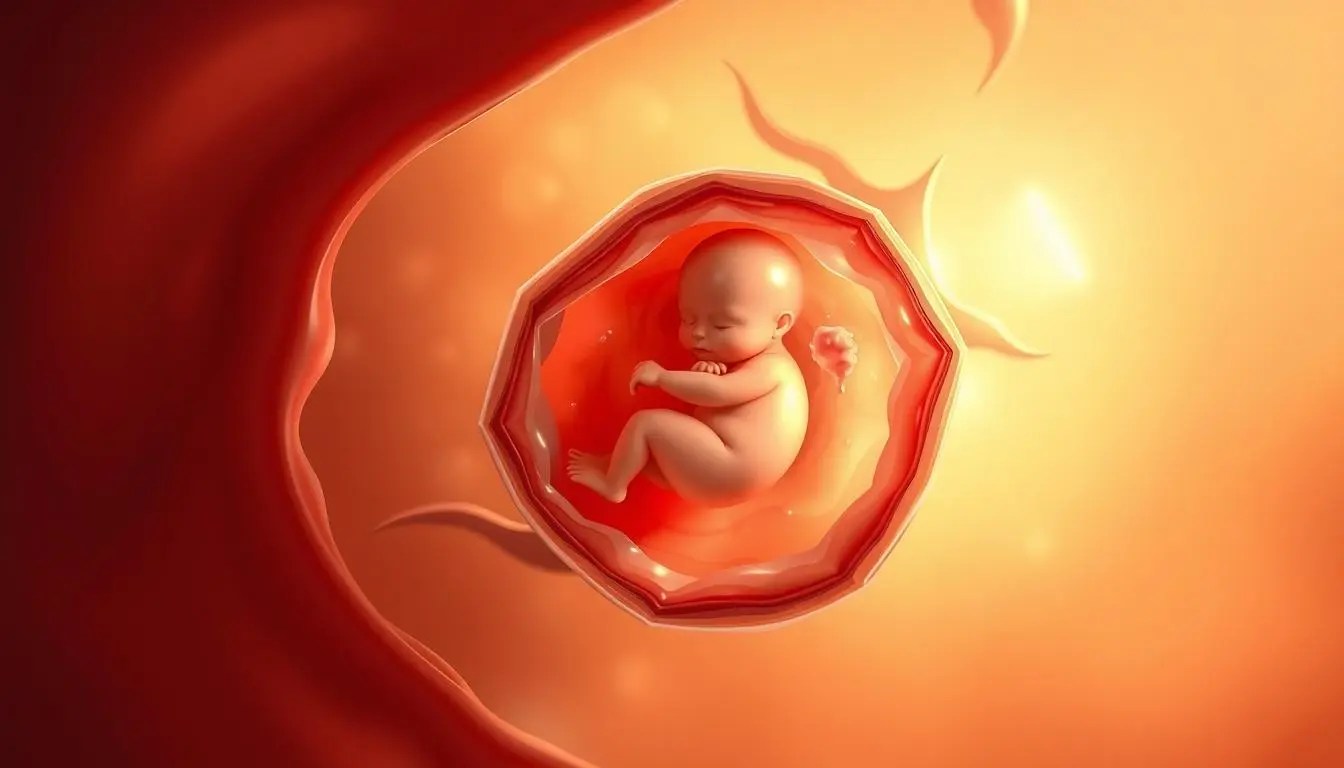
As we explore the amazing journey of pregnancy, a common question pops up: do babies sleep in the womb? Learning about fetal development and sleep can give us a peek into an unborn baby’s life.
Studies on fetal development have uncovered interesting facts about unborn babies’ behaviors and sleep patterns. In this article, we dive into nine fascinating facts. They help us understand if babies sleep in the womb and offer a detailed look at pregnancy facts.
Key Takeaways
- Fetal development is a complex process influenced by various factors.
- Understanding sleep patterns in the womb can provide insights into fetal health.
- Pregnancy facts reveal the intricacies of an unborn child’s life.
- Fetal behavior is a key indicator of overall development.
- Research into fetal sleep patterns continues to uncover new information.
- The womb environment plays a critical role in shaping fetal development.
Help Your Baby Sleep Soundly – Shop Top Baby Sleep Products on Amazon
Getting your baby to sleep through the night is every parent’s dream. From comfortable sleeping gear to soothing sleep aids, baby sleep products are designed to create a safe and peaceful sleep environment, ensuring your little one (and you) get the rest you need.
🛏️ Crib mattresses, sleep sacks, and swaddles
🌙 White noise machines, night lights, and lullabies
🛌 Bassinets, pack n’ plays, and portable sleepers
👉 Shop baby sleep essentials on Amazon
✔️ Trusted brands like Halo, Graco, Fisher-Price, and Summer Infant
✔️ Safe, comfortable, and soothing solutions for babies
✔️ Fast delivery and helpful customer reviews
Make bedtime easier for your baby — and enjoy peaceful nights for your whole family. 🌟
The Remarkable World of Fetal Development
Exploring fetal development reveals how babies interact with their surroundings in the womb. This process is complex, involving many systems working together. It leads to the birth of a healthy baby.
How Babies Experience the Womb Environment
The womb environment is key to fetal development. Studies show babies can sense sounds and light. This experience may shape their behavior and preferences after birth.
The Importance of Understanding Fetal Sleep
Understanding fetal sleep is vital for knowing a baby’s health. Fetal sleep has active and quiet phases, influenced by the mother’s diet and stress. Studying fetal sleep helps us understand prenatal and postnatal development.
Do Babies Sleep in the Womb? The Scientific Evidence
Research has given us a lot of insight into how unborn babies sleep. This knowledge is key for parents-to-be and doctors. It shows us how babies grow and develop in the womb.
Babies Begin Sleeping as Early as 20 Weeks
Studies show that babies start sleeping at 20 weeks of pregnancy. Their sleep is simpler than ours but is vital for their growth. Their sleep cycles, with active and rest periods, are the start of what we see after birth.
How Scientists Detect and Measure Fetal Sleep
Scientists use ultrasound and heart rate monitoring to study fetal sleep. These tools help them see how babies sleep patterns change as they grow.
| Method | Description | Gestational Age |
|---|---|---|
| Ultrasound | Observes fetal movement and activity | 16 weeks and beyond |
| Fetal Heart Rate Monitoring | Measures heart rate variability during sleep and wakefulness | 20 weeks and beyond |
| Maternal Observation | Tracking fetal movement patterns | 24 weeks and beyond |
The Evolution of Sleep Throughout Pregnancy
From the start of pregnancy, the fetus’s sleep patterns start to form and grow. As the pregnancy goes on, the fetus’s sleep cycles get more complex and mature.
Fact3: First Trimester – The Foundations of Sleep
In the first trimester, the base for fetal sleep patterns is set. Even though the fetus is just starting to grow, the first sleep cycles start to show up. By about 10-12 weeks, the fetus begins to have rest and activity periods. These are the early signs of sleep cycles.
Fact4: Second Trimester – Developing Sleep Cycles
In the second trimester, the fetus’s sleep cycles get stronger. By the 20th week, the fetus can go through different sleep stages, like REM and non-REM sleep. This is key for the brain’s growth and fetal development.
Fact5: Third Trimester – Sleep Patterns Mature
By the third trimester, the fetus’s sleep patterns have really grown up. The sleep cycles become more regular, and the fetus can go through various sleep stages, including deep sleep and REM sleep. This growth is vital for prenatal development and gets the fetus ready for life outside the womb.
Learning about how sleep changes during pregnancy helps us understand fetal development and prenatal development. As the fetus grows, its sleep patterns get more advanced. This sets the stage for a healthy sleep cycle after birth.
REM and Non-REM Sleep in Unborn Babies
Exploring fetal development, we find the sleep patterns of unborn babies truly captivating. Research shows that they go through REM (Rapid Eye Movement) and non-REM sleep stages. These stages are vital for their growth.
Babies Experience REM Sleep Before Birth
Studies indicate that unborn babies start experiencing REM sleep by 23 weeks. REM sleep is significant for their brain and nervous system development. It’s when their brain activity is most like an adult’s during REM sleep.

How Fetal Sleep Cycles Differ from Adults
Fetal sleep cycles are quite different from adults. Unborn babies have shorter sleep cycles with more frequent changes. This unique pattern supports their rapid brain and nervous system growth, influenced by their mother’s health.
Grasping these differences helps us understand the complex fetal development. It shows how these early stages set the stage for the baby’s health and well-being after birth.
How Maternal Activities Affect Baby’s Sleep in Utero
Maternal health and daily activities greatly influence an unborn baby’s sleep. Many factors shape the sleep quality and patterns of fetuses.
The Impact of Mother’s Movement and Position
A mother’s movement and position can greatly affect her baby’s sleep. Research shows that active mothers can influence their baby’s sleep cycles. Gentle exercises during pregnancy can help regulate the baby’s sleep patterns.
On the other hand, long periods of inactivity or certain positions may harm the baby’s comfort and sleep quality.
Maternal Diet and Circadian Rhythms
A mother’s diet is key in setting her baby’s circadian rhythms. Eating a balanced diet rich in nutrients supports the fetus’s internal clock. Studies also show that meal timing can influence the baby’s sleep-wake cycle.
This can set the stage for future sleep patterns after birth.
Stress and External Stimuli Effects
Maternal stress and external stimuli can also affect a baby’s sleep in utero. High stress levels can change fetal heart rate and movement, disrupting sleep. Loud noises or environmental changes can also harm the baby’s sleep quality.
| Maternal Factor | Impact on Fetal Sleep |
|---|---|
| Mother’s Movement and Position | Influences sleep cycles and comfort |
| Maternal Diet | Establishes circadian rhythms |
| Stress and External Stimuli | Can disrupt normal sleep patterns |
Fetal Movement and Sleep: What Expectant Parents Should Know
Expectant parents are excited to meet their baby. Learning about fetal movement and sleep patterns is both interesting and comforting. Fetal growth is a complex process, with sleep and movement playing key roles.

Babies in the womb have their own sleep and wake cycles. This affects how they move. Knowing this can make expectant parents feel closer to their unborn child.
Babies Have Sleep-Wake Cycles That Affect Movement
Studies show babies as young as 20 weeks have sleep-wake cycles. These cycles influence their movement. When awake, babies move more. When asleep, they move less.
This pattern of activity and rest is a natural part of fetal growth. Expectant parents might notice their baby is more active at certain times. This could be due to the baby’s sleep-wake cycle or the parents’ activity.
When to Be Concerned About Changes in Movement Patterns
While changes in fetal movement are common, big changes can be a worry. Expectant parents should know their baby’s usual movement patterns. They should tell their healthcare provider if these patterns change a lot.
A big drop or rise in fetal movement might mean a problem. But remember, every pregnancy is different. What’s normal for one baby might not be the same for another.
The Mysteries of Fetal Consciousness
The mysteries of fetal consciousness have long fascinated many. Scientists and expectant parents alike are drawn to this topic. We find fascinating insights into how human consciousness develops before birth.
Fetal consciousness is about the fetus’s awareness in the womb. Recent studies have given us new insights. They challenge what we thought we knew.
Evidence of Dreaming in the Womb
Research shows babies might dream in the womb. Studies found that in the third trimester, fetuses show brain wave patterns like those in REM sleep. This is seen in newborns and adults too.
This means fetuses might dream or be conscious before birth. This finding is exciting and opens up new ways to understand fetal development.
Babies Can Learn and Remember Before Birth
Babies can learn and remember before they are born. Research shows they can detect and respond to sounds and vibrations.
For example, studies found newborns prefer their mother’s voice. This shows they learned this while in the womb. It highlights the amazing abilities of the developing fetus.
| Aspect of Fetal Development | Description | Implications |
|---|---|---|
| Fetal Consciousness | Awareness or perception of the fetus during development | Challenges our understanding of consciousness and cognition |
| REM Sleep in Fetuses | Brain wave patterns similar to REM sleep in newborns and adults | Suggests possibility of dreaming or consciousness before birth |
| Prenatal Learning | Ability of fetuses to detect and respond to external stimuli | Demonstrates learning and memory capabilities before birth |
Conclusion: The Wonders of Life Before Birth
Exploring fetal development shows us that knowing if babies sleep in the womb is just the start. We’ve learned about the amazing processes in fetal growth, from sleep cycles to learning and memory before birth.
Maternal health is key to fetal development. What the mother eats, moves, and feels affects the baby’s growth. Expectant parents can help by focusing on a healthy pregnancy.
More research will help us understand fetal development better. As we learn more about fetal sleep and its link to maternal health, we might find new ways to support pregnant women. This could lead to better health outcomes for babies.
FAQ
Do babies sleep in the womb, and if so, when does this start?
Yes, babies do sleep in the womb. Studies show they start as early as 20 weeks into pregnancy.
How do scientists detect and measure fetal sleep?
Scientists use ultrasound and fetal heart rate monitoring. These methods help detect and measure fetal sleep patterns.
How do maternal activities affect a baby’s sleep in the womb?
Maternal activities like movement and diet can affect a baby’s sleep. Stress and external stimuli also play a role.
Can babies experience REM sleep before birth?
Yes, research indicates babies experience REM sleep before birth. This stage is marked by rapid eye movements and brain activity.
How do fetal sleep cycles differ from those of adults?
Fetal sleep cycles are very different from adults. They are shaped by the womb environment.
What should expectant parents know about fetal movement and sleep?
Expectant parents should know babies have sleep-wake cycles that affect movement. Changes in movement can be a concern.
Is there evidence that babies can dream in the womb?
While it’s hard to say for sure, research suggests babies may experience consciousness or dreaming in the womb. The exact nature of this is not fully understood.
Can babies learn and remember before birth?
Yes, research shows babies can learn and remember before birth. This highlights the complex processes of fetal development.
How does the womb environment impact fetal development?
The womb environment is critical for fetal development. Maternal health and lifestyle greatly influence the baby’s growth and well-being.
Why is understanding fetal sleep important for maternal health?
Understanding fetal sleep patterns offers insights into the baby’s health. It helps expectant mothers promote healthy development.







